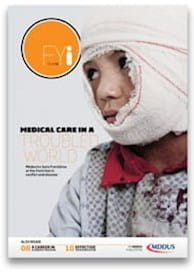A GREAT teacher of mine, Dr David Gray, once told me “define or die”. What then are “human factors”? There are numerous definitions out there, some simpler than others.
The UK’s Clinical Human Factors Group (CHFG) describes it as: “Enhancing clinical performance through an understanding of the effects of teamwork, tasks, equipment, workspace, culture, organisation on human behaviour and abilities, and application of that knowledge in clinical settings.”
This doesn’t lend itself to being easily memorised, so if we apply the KIS (keep it simple) principle then the term “human factors” may be defined as:
1. All the things that affect human performance
2. The field of study of all the things that affect human performance.
Performance modifiers
Whenever you are carrying out a task there will be internal and external modifiers of your performance. As I sit here writing this article these include: the uncomfortable wooden chair I’m sitting on, the distractions through the window, the copy deadline and lack of sleep. They might also include: the type of computer and word processing software I’m using and that I’ve had breakfast and two cups of tea.
If you think back to your last insertion of an intravenous cannula you may be able to identify the human factors which affected your performance such as tiredness, number of jobs still to do, audience (including the patient), number of attempts already made, familiarity with the technique, lighting, and so on. Until recently, in medicine anyway, the idea that your performance is affected by these modifiers was neither much appreciated nor understood.
Internal modifiers
- Emotional state
- Concentration on task
- Expertise with task
- Ability to communicate
External modifiers
- Design of equipment
- Support from senior
- Training
- Rota intensity
The first change which occurred was an appreciation that medicine is a high-risk industry; in the UK thousands of patients are killed or harmed every year due to mistakes made by healthcare professionals. Once this had been acknowledged, the lessons learned and vocabulary from other high-risk industries, such as aviation, off-shore drilling and nuclear power, were adapted and translated into healthcare.
Analysing factors
How then can “human factors” help us avoid medical error? Through the study of what affects human performance we can try to minimise (never “eliminate”) human errors as well as minimising their effects. One may wish to divide the modifiers into internal and external. (See the table above).
An appreciation of human factors can help us understand what internal and external modifiers are affecting our abilities. It may also allow us to see which modifiers are potential causes for mistakes and allow us to redress these.
The value of simulation
Attending courses at a simulation centre may help you identify internal modifiers contributing to your mistakes. Video-assisted debriefing allows you to reflect on your performance. With the help of a facilitator and your peers, you may learn where your strengths and weaknesses are. In situ simulation involves using the mannequins in the workplace; this is where external modifiers may be discovered such as lack of equipment, lack of support, organisational blind spots, etc.
Getting started
You can start applying the lessons of human factors research today. An important first step is accepting that we are all human and will inevitably make mistakes no matter what stage we are at in our careers.
Ask yourself: where are your strengths and weaknesses (and how might you find out about them)? What can you do to address these? What are the things in your workplace which may lead to human error? Who can you talk to in order to remove or minimise these risks? Human factors provides us with the vocabulary to talk about what is going wrong and the tools to mitigate this.
Self-awareness in your day-to-day work will help you admit when you are tired, stressed or distracted. These human factors increase the risk of making a mistake, and are particularly relevant in situations where you are required to make complex calculations in drug dosages or equipment settings.
Taking time to double-check your decision-making is one useful way to start “error-proofing” your work.
As trainee doctors, you might also find yourself trying to remember 10 different things to do – again increasing the likelihood of mistakes. The human brain can only have seven or eight things at its forefront at any one time, so consider drawing up a checklist to give yourself a visual reminder.
There are many more tips and techniques available and applying these human factors concepts in your practice will make you a better doctor.
Recommended watching:
CHFG video, Just a routine operation
BBC Horizon programme: How to Avoid Mistakes in Surgery (available on YouTube)
Recommended reading:
• Sidney Dekker, The Field Guide to Understanding Human Error
• Rhona Flin et al, Safety at the sharp end
• Atul Gawande’s books: Complications, Better and The Checklist Manifesto
• Alissa Russ et al. “The science of human factors: separating fact from fiction” in BMJ Quality & Safety
• Charles Vincent, Patient Safety
Dr Michael Moneypenny is a consultant anaesthetist and expert in the field of human factors in healthcare. He is also director of the Scottish Clinical Simulation Centre
This page was correct at the time of publication. Any guidance is intended as general guidance for members only. If you are a member and need specific advice relating to your own circumstances, please contact one of our advisers.
Read more from this issue of FYi

Save this article
Save this article to a list of favourite articles which members can access in their account.
Save to library
